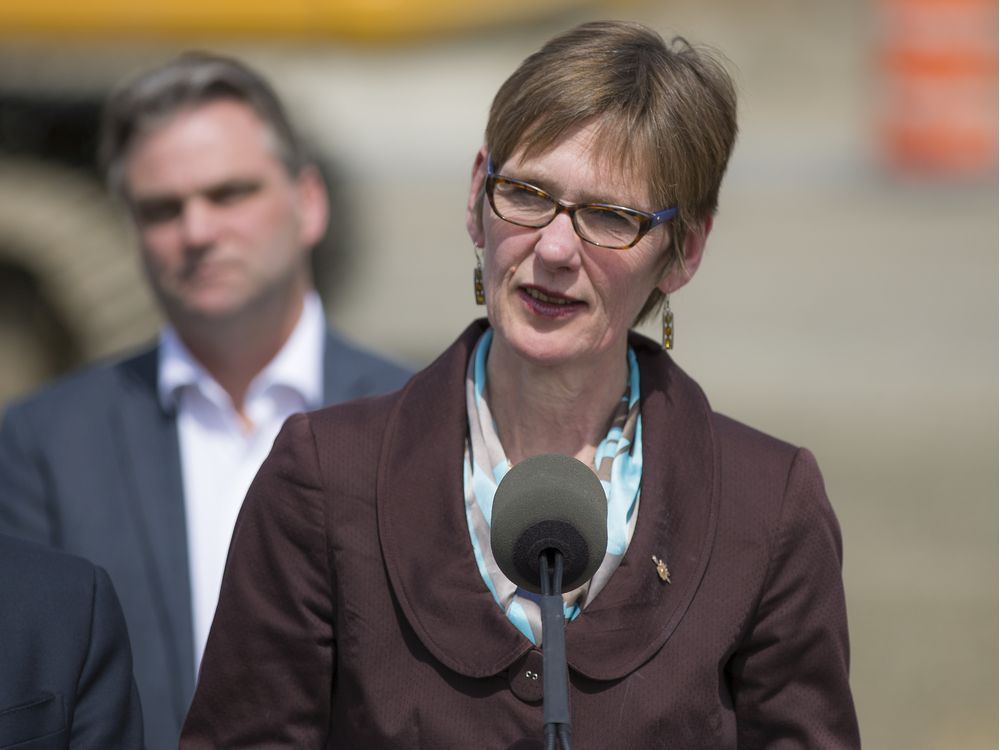Fudging highway cost overruns by applying curious math to CBA's impact

Credit to Author: Stephen Snelgrove| Date: Fri, 06 Sep 2019 04:06:20 +0000
VICTORIA — The New Democrats admitted to a major budget overrun on a big-ticket highway project Thursday, while minimizing the added cost of one of their union-favouring community benefit agreements.
Transportation Minister Claire Trevena claimed the CBA added a mere 5.8 per cent to the cost of four-laning an onerous stretch of the Trans-Canada Highway through Kicking Horse Canyon.
But to get an accurate perspective on the impact of NDP policy on the budget, one had to look back to a disclosure statement posted on her ministry website a little over two years ago.
The statement, filed under provincial budget legislation, put the cost of four-laning just under five kilometres of highway through the canyon at an already hefty $450 million.
It went on to acknowledge some “primary risks” to the project budget including changes because of “cost escalation, stakeholder feedback, geotechnical and environmental issues, traffic management during construction and archaeological issues.”
But the statement, signed by the project manager on March 17, 2017, also said that “the project scope, schedule and budget have been developed with consideration for the above risks and probability of occurrence.”
Despite those assurances, the ministry announced Thursday the projected cost had overshot the two-year-old estimate by almost a third. The $450 million has now become $601 million.
The escalation was attributed in part to interest during construction of $23 million, a factor that was inexplicably not included in the original estimate.
Plus there was $39 million in additional funding for things that were supposedly incorporated in the earlier estimate, including cost of materials, geotechnical concerns, and engineering and design changes. Also $6 million for additional archaeological work, consultations with First Nations and technical resources.
The ministry added $48 million to the contingency budget “to reflect the risk and complexity of the project.”
How big was the contingency allowance in the 2017 budget, where all those identified risks were supposedly taken into account? The ministry refused to say.
Then came $35 million as the imputed cost of the community benefit agreement, to cover NDP-imposed standards for hiring, training, living accommodations, pensions and other benefits and working conditions.
The New Democrats derived their lowball estimate of 5.8 per cent by comparing the $35 million to the revised project budget of $601 million.
But the claim did not stand up to scrutiny based on another budget consideration that was addressed back in the 2017 statement.
Because this project entails rebuilding the Trans-Canada Highway, the budget is cost shared between the federal and provincial governments.
But Ottawa shrewdly capped its contribution at $215 million, leaving B.C. to pick up the balance, plus 100 per cent of any overruns. The split seems especially fair in the case of the community benefits agreement, since it was something the New Democrats added to the mix after the federal government locked its contribution.
Thus, B.C.’s share has gone from $235 million before the overruns to $385 million after, an increase of two thirds. The CBA added nine per cent to the provincial share, not the just under six per cent claimed by the New Democrats.
If one deducts the cost of interest during construction — which was there all along whether or not the province admitted it — then the added costs to the provincial share amount to $128 million under the NDP. By that reckoning the CBA contributed 27 per cent of the provincially-driven overrun.
The briefing materials for Thursday’s presentation shed some additional light on the impacts of the CBA, which has been cloaked in secrecy since the New Democrats set the policy in motion.
Wages and benefits account for only about a third of the $35 million. There’s also a $15 million provision for living accommodations, meaning a state-of-the-art work camp for the isolated site.
Lastly, the breakdown included $8 million spread over four years to cover operational costs for B.C. Infrastructure Benefits, the Crown corporation established by the New Democrats to administer the community benefit agreements.
The BCIB is now up and running with a staff of 32 and an annual budget of $8 million. The agency claimed in a briefing document that great strides are being made in recruiting under-represented groups to the construction workforce, including local hires, apprentices, women and Indigenous people.
The first of the community benefit agreement projects, launched earlier this year, is the widening of a two-kilometre stretch of the Trans-Canada along the Illecillewaet River east of Revelstoke.
“Were operational,” boasted the agency, in claiming that 11 of the 15 people working on the project were from “one or more approved hiring categories.”
That project has gone over budget under the NDP as well. Announced at $63 million in February of this year it grew to $85 million when the contract was awarded in May, again with the province on the hook for the entire overrun.
I wondered how much of the $22 million could be attributed to the community benefits agreement. But the ministry declined to say, perhaps realizing that the price tag might seem disproportionate when contrasted to BCIB having recruited a mere 11 hires in the preferred categories.
Meanwhile it should be noted that Thursday’s announcement on the Kicking Horse Canyon stretch was a call for qualified bidders, not awarding the contract, never mind the start of construction.
All that is slated to happen next summer, by which time who knows what additional budgetary surprises may emerge.
CLICK HERE to report a typo.
Is there more to this story? We’d like to hear from you about this or any other stories you think we should know about. Email vantips@postmedia.com